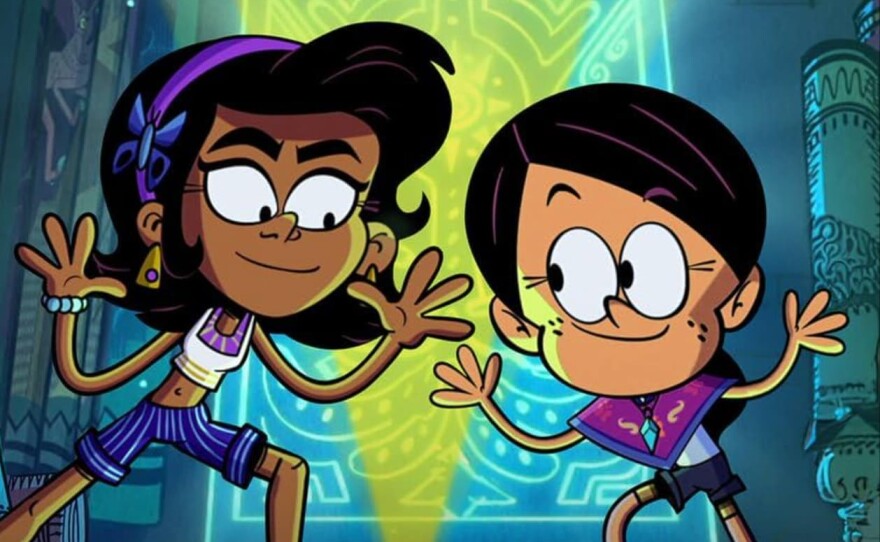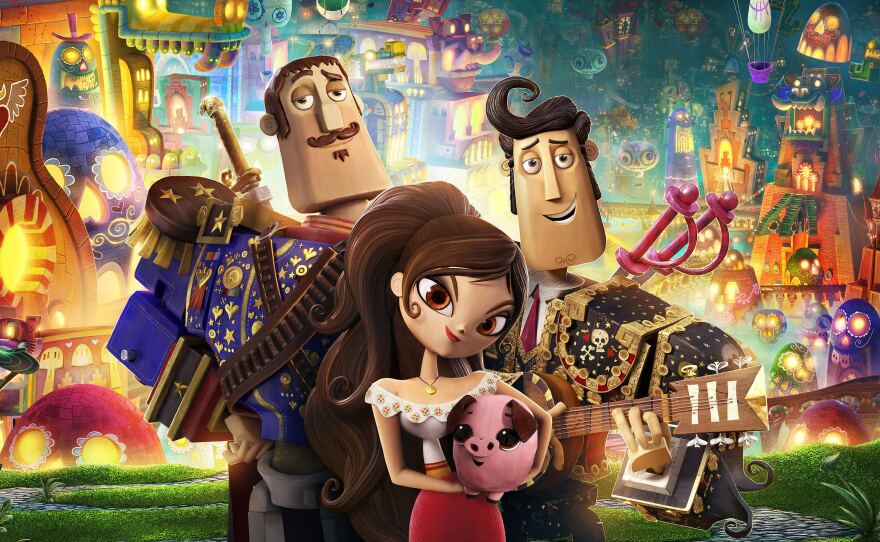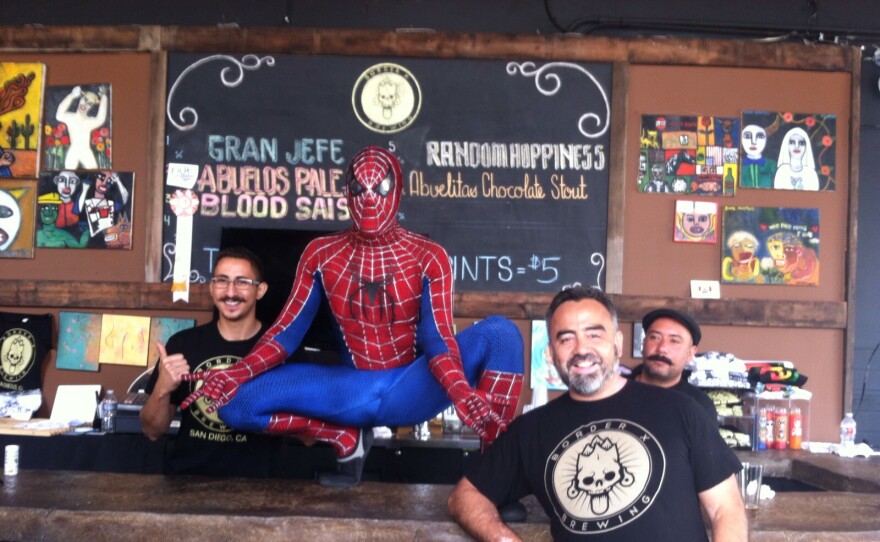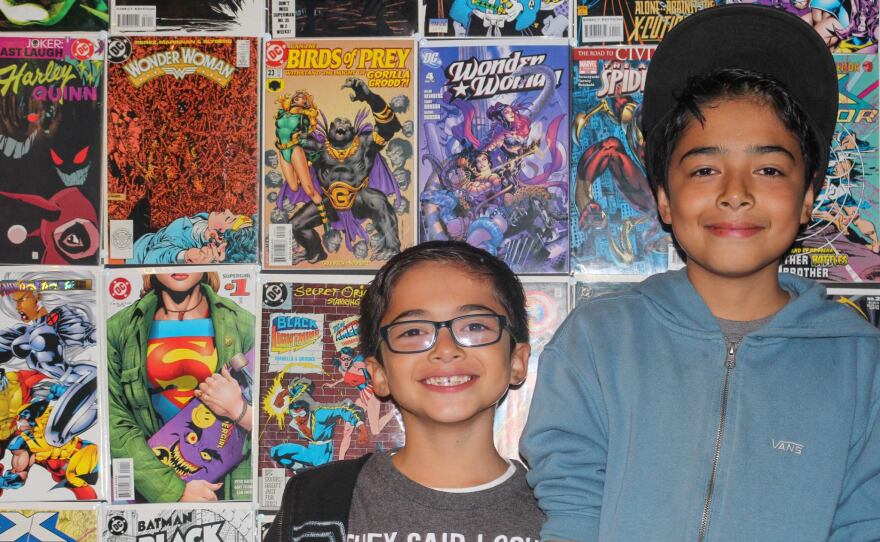As San Diego Comic-Con descends on downtown San Diego this week, Barrio Logan’s Border X Brewing is hosting its 2024 edition of Chicano-Con.
The brewery is about 1.5 miles from the action at the Convention Center. Its ninth annual event is meant to “recreate the magic” of the comic book and popular culture convention for those who can’t attend. It will include a panel discussion with several high profile Latino/e/x creatives, who will share secrets and insights on what it takes to be seen in today’s industry.
Among the big names attending this year’s Chicano-Con is Lalo Alcaraz, who was born and raised in San Diego. He is the creator of the nationally syndicated comic, “La Cucaracha” and the producer of the recently-released animated Netflix film, “The Casagrandes Movie,” a comedy about what happens when a surprise family vacation to Mexico goes off track.
Also headlining this year’s event is award winning director, writer, producer, animator, voice actor and painter Jorge Gutiérrez, who was born in Mexico City and raised in Tijuana. His filmmaking credits include the animated film “The Book of Life,” as well as hit television series “Maya and the Three” and “El Tigre: The Adventures of Manny Rivera.”
Alcaraz and Gutiérrez shared insights on their success in telling Latina/o/e/x stories in industries where they have historically been underrepresented and struggle to get support.

Finding inspiration
Alcaraz said for him it started at a young age, watching how his parents, who came to the U.S. from Sinaloa and Zacatecas, Mexico were mistreated as immigrants.
He added that arts and humor runs in his family. He said his parents were “really funny.” And several members of his family are artists, painters, singers and musicians.
Alcaraz, who won the Herblock Prize for editorial cartooning in 2022, said he drew his first political cartoons in college at San Diego State University. He was a student activist and member of MEChA de SDSU, a student run organization that provides on campus community empowerment to Latinx students.
“It was great, it was like a rapid response and I was like, ‘I like this,’” Alcaraz said. “It's on us to defend people that can't defend themselves. A lot of my work is that.”
Gutiérrez remembers when he was nine years old his parents would take the family to museums to see the work of Mexican artists and muralists such as Diego Rivera, Frida Kahlo, David Alfaro Siqueiros and José Clemente Orozco.
In Tijuana, he remembers developing a fascination with the mixture of Mexican and American culture when he would cross the border.
“I loved all that stuff. I love seeing a fake painting of Homer Simpson wearing a sombrero and Scarface eating tacos with Marilyn Monroe dressed like Day of the Dead,” Gutiérrez said.
One of his big moments came when Gutiérrez was 17 years old and applied to art school. A recruiter (Jules Engel, a legend of animation) initially rejected him, after he submitted drawings of Bugs Bunny, Mickey Mouse and Bart Simpson. Gutierrez didn’t show Engel what he loves to draw, which includes Lucha Libre, chupacabras and Day of the Dead. But Engel ended up calling him back after finding Gutiérrez’ paintings underneath the artwork he rejected. Gutiérrez said Engel was surprised he didn’t show him those paintings first. He remembers Engel telling him, “this is your voice.”
“And people ask me, ‘what was your origin story as an artist?’ That is the moment. It took a foreigner, it took a Hungarian man in Los Angeles to tell a kid from Tijuana, ‘be yourself,’” Gutiérrez said.
Finding time
For aspiring artists worried they don’t have all the resources or time to devote to their creative dreams, both Alcaraz and Gutiérrez explained they also have spent their lives often working beyond the typical daytime hours. Even now their schedules are beyond full. Both are working on multiple projects at the same time.
Alcaraz, who is the first Latino to have a nationally syndicated comic strip, offered the following encouragement for aspiring artists.
“The only advice I can give is, if you’re gonna be a cartoonist, artist, writer, or whatever, you won’t stop, you could say don’t stop, right, but it’s more of a thing where you're not going to stop,” Alcaraz said. “It’s something you have to do your whole life, it's not a hobby thing. If you’re meant to be a cartoonist, it’s going to flow out of your hands. And you can’t stop, you just keep doing it because you have to.”
Gutiérrez shared that he is autistic. He said he was diagnosed when he was 40 years old. He said he has ADHD and autism and that this makes him very good at focusing. In high school he was a terrible student, but in film school he found something he was “incredibly passionate about.”
“And I can tell you that when I graduated from school, and everybody struggles right out of school, I had regular jobs where I would work from 9:00 to 5:00,” Gutiérrez said. “To me, the secret of success in animation is if you can fall in love with the process. And when I say the process, it's the work. If you can fall in love with the work and not with the result, then you're going to be happy the rest of your life. If you're only in it for the result, the money, the adoration, whatever it is, the carat of success, you're going to be miserable because it will never be enough.”

Finding support
Having a supportive network has also contributed to the success of both artists.
A two-time finalist for the Pulitzer Prize, Alcaraz explained he has received hate mail throughout his career. And there have been some close calls to cancel “La Cucaracha,” his comic strip that speaks against racism and injustice. But he has yet to lower the volume. He said his parents were always supportive, in particular his mother.
“That was my mother for sure,” Alcaraz said. "But yeah, she taught me like, 'No te dejes,’ don't let people walk all over you.'” And her advice continues to influence his work.
Gutiérrez is currently working on a new animated movie called “I, Chihuahua!” He said the film is a metaphor for every underdog. He himself has experienced rejection and he also credits his family for teaching him failures make you stronger.
He said his father told him, “‘It's one more stripe for a tiger. You were born a little puma, Jorge. Every experience you get into is a stripe. Good or bad, there's stripes. That's experience. When you die, Jorge, I want you to die a panther because you've experienced everything. So good or bad, they're just experiences. And you get back up and you keep fighting for the good fight.’”
“And that changed me forever. So anytime I got rejected, instead of getting angry or depressed, I would go, one more stripe. And I got better. Bring on the next one,” Gutiérrez added.

Chicano-Con
Gutiérrez and Alcaraz will share more about their work and lives at Chicano-Con starting at 6:00 p.m. Saturday at Border X Brewing.
Owner and event organizer David Favela considers himself a comic nerd. He said he learned how to read using comic books in the second grade. In recent years, he noticed how hard it was to get a ticket to go to Comic-Con and that there was no space for Latina/o/e/x artists and creatives to congregate.
“So I thought why not host a version of it in Barrio Logan because we’re so close and make it about the kids and bring a little bit of that cosplay, fantasy, magic to the barrio just like I got as a child,” Favela said.

Favela added the reason he added the panel discussion is he feels those who make the decisions about the popular arts don’t realize Latino/e/x are comic book nerds as well.
“I’ve always wanted to see stories, for example, a hero in Aztec times with Aztec mythology, and Aztec lore and imagery, and I thought that would be so rich, but that’s not happening, although we make up 50% of the consuming public,” Favela said.
Gutiérrez added he is hopeful about the future of increasing Latino/a/e/x creative content.
“We're in a good time, but our people have to speak with their wallet and support. Take a chance. Just like you take a chance on a movie you're not sure about, take a chance on a movie you're not sure about Latinos. Latino culture, Latino directors, and Latino actors. Take a chance. Don't wait,” Gutiérrez said.
There is a $20 fee for the panel discussion with Latinx creatives on Saturday. All other events are free except for food and drinks.
To get more information on Chicano-Con’s schedule of events, check out Border X Brewing’s Instagram page. Chicano-Con runs from Thursday, July 25 to Sunday, July 28. Border X Brewing, 2181 Logan Ave., Barrio Logan.






